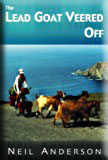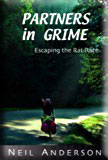
|
Homesick
We rose early, wanting to be on our way before the shepherd or military made a repeat appearance. The weather still wasn't the best for cycling, but we had zero food, and I knew I couldn't make it through another day without sustenance - at least not happily. As we packed, sheep hesitantly stumbled to the sluggish river for their morning drink; their sharp reflection in the still water doubled the size of the herd. Half pulling, half pushing, we urged our mule-like laden bikes back up the four-wheel drive embankment to the main road, and set off into a howling headwind. Even without the wind, the mountainous terrain would have made for slow going. We toiled up steep pitches in our lowest gear, only to be confronted with the wind in our face at the top. It frayed our nerves that we had to pedal hard to go downhill; it seemed like such a rip-off. After struggling to the top, we felt we should at least be rewarded with a coast down. At least our snail pace gave us a chance to soak in the tranquil wilderness vistas. It all seemed so idyllic. Then, rounding a corner, our senses were assaulted with an obscene monstrosity, dark and brooding. Unbelievably, bursting out of the landscape, was a nuclear power stack! Talk about stomping on nature's tranquillity! The new-age nuraghe failed miserably to blend in. We left the cooling funnel's shadow behind, and pumped onward and upward, discussing the island's incongruities. "Isn't it strange they have nuclear power before everyone has running water?" Sharon commented. We arrived in the village of Ottana just before noon. I hurried into a grocery store before it closed for lunch and bought the one remaining loaf of bread. In the town square we found a bench and, amidst inquisitive stares from locals, tore hungrily into the dark loaf. The bread was as dry as a brick, and like some mangy old cat, clawed at my throat. I wondered if it had been baked during the same period as the 12th-century Romanesque church we were sitting beside. "I wish I had an orange," Sharon coughed after choking down her share of the sandpaper bread. Alas, the fruit stores were closed. Our timing was uncanny. Somehow we always managed to arrive in towns during their closed hours. "Where are those independent fruit sellers when I need them?" Sharon sputtered. It was true. Usually several trucks were parked along main street with farmers hawking their orchard produce. But there wasn't a one in sight. Since there was nothing open, we decided to head toward Fonni, a tiny ski resort town that boasted the distinction of being the highest locale in all Sardinia. Leaving Ottana Sharon's wish was granted when I practically ran into the back end of a fruit seller's truck. We bought three kilos of homegrown oranges from the friendly farmer, bungeed them onto our racks, and were trying to pedal away as the farmer was unzipping our panniers and stuffing still more oranges inside. It wouldn't have been bad, but we were headed up a mountain and didn't need all the extra weight. We made several stops on our way up to eat oranges! By the end of our riding day we had gone from walnut and citrus trees to snowy peaks! I never expected to be surrounded by snow on an island in the middle of the Mediterranean. I felt cheated - I had seen enough snow in Canada and didn't have to go on holidays to see more. Maybe I should have brought my studded tires? Seeing the snow reminded Sharon to phone home. Unfortunately, public telephones are not as common on Sardinia as they are in North America. Finding one was guaranteed to be a challenge. We finally located one in a bar, and while Sharon caught up on news from home, I silently immersed myself in an episode of Star Trek blaring from an overhead television. It was a rerun, of course, but I was spellbound - I had no idea Captain Kirk spoke such fluent Italian. But, if he aspired to be a true native, he had to learn to wave his arms a whole lot more. When the show ended, I glanced around and saw Sharon was still on the phone. It was growing late. Not only was the call costing us a bundle, but we were going to be cycling in the dark to boot. I pointed furtively to my watch. In a few minutes Sharon said goodbye into the mouthpiece. Giving me a sad face, she replaced the handset. That's what I hated about phone calls home. After each one, instead of being happy that she had gotten a chance to speak with everyone, instead was struck with a terrible bout of homesickness. Her usual latent pangs presented themselves full-blown. "We're missing out on seeing our nieces and nephews grow," she whispered to me, her eyes moist. "Mom said Cal and Katie have changed so much" her voice trailed off. "Will they even remember us when we get home?" I didn't know the answer. Instead, I put my arms around her and tried to comfort her shaking body. We knew that by choosing to do an extended trip we had forfeited sharing in our young nieces' and nephews' experiences. It was difficult. Since they were so young, we were missing their hyper period of growth - that time in their lives when they discovered a world of "firsts." As well as not being part of our family's everyday lives, we had also sacrificed those special get-togethers: holidays, weddings, births, and reunions. "Maybe we can hurry up the trip," Sharon said, "so we can finish sooner. We're not going anywhere anyway. We're just in a holding pattern, waiting for the weather to warm enough so we can head to northern Europe. Even then, we won't be making progress on our around-the-world trip by meandering north and south," she complained. She was right. "That depends on which way we go around the world," I kidded. "What's it like cycling in Antarctica anyway?" Sharon didn't crack a hint of a smile. "Think about this portion as the European Tour," I tried again, hoping to ease her fragile emotional state. Sharon possessed a highly logical mind, and I knew if I tried to justify our zigzag path, I would open a can of worms I could not contain. We noticed that something about our trip had begun to change. Before, the scenery had been our focus - everything was new and different. But it was startling how quickly we had become accustomed. Orange, cork, and olive trees - so exotic when we first saw them - had become as familiar as pine, fir, and spruce trees. Architecture that had held such charm when we first arrived became about as exciting as a doughnut shop (maybe less so - at least I could get something to eat in a doughnut shop). Our days had become: "Oh, another church. Want to look inside?" "Naw, I've seen enough churches." Even the food tasted less foreign - we could eat olives with the best of them. Maybe it was inevitable for a trip of this length, but we found that people were becoming the most important aspect of our journey - both those we met while travelling, and our poor neglected friends and family back home. The scenery remained grand, but we began to realize it was the persons we met along the way that we cherished the most. We were sure that long after we had returned home, they would be our fondest memories. Our trip had definitely entered a new stage. |

